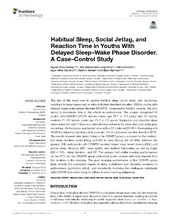| dc.contributor.author | Saxvig, Ingvild W. | en_US |
| dc.contributor.author | Wilhelmsen-Langeland, Ane | en_US |
| dc.contributor.author | Pallesen, Ståle | en_US |
| dc.contributor.author | Nordhus, Inger Hilde | en_US |
| dc.contributor.author | Vedaa, Øystein | en_US |
| dc.contributor.author | Bjorvatn, Bjørn | en_US |
| dc.date.accessioned | 2020-08-07T11:07:59Z | |
| dc.date.available | 2020-08-07T11:07:59Z | |
| dc.date.issued | 2019-11-12 | |
| dc.Published | Saxvig IW, Wilhelmsen-Langeland AB, Pallesen S, Nordhus IH, Vedaa Ø, Bjorvatn B. Habitual Sleep, Social Jetlag, and Reaction Time in Youths With Delayed Sleep–Wake Phase Disorder. A Case–Control Study. Frontiers in Psychology. 2019;10:2569 | eng |
| dc.identifier.issn | 1664-1078 | |
| dc.identifier.uri | https://hdl.handle.net/1956/23548 | |
| dc.description.abstract | The aim of this study was to explore habitual sleep, social jetlag, and day-to-day variations in sleep (measured as intra-individual standard deviation, ISD) in youths with delayed sleep–wake phase disorder (DSWPD), compared to healthy controls. We also aimed to investigate time of day effects in performance. The sample comprised 40 youths with DSWPD (70.0% female, mean age 20.7 ± 3.1 years) and 21 healthy controls (71.4% female, mean age 21.2 ± 2.2 years). Subjective and objective sleep were measured over 7 days on a habitual sleep schedule by sleep diary and actigraphy recordings. Performance was tested twice with a 12-h interval (22:00 in the evening and 10:00 the following morning) using a simple, 10-min sustained reaction time test (RTT). The results showed later sleep timing in the DSWPD group compared to the controls, but sleep duration, social jetlag, and ISD in sleep timing did not differ between the groups. Still, participants with DSWPD reported longer sleep onset latency (SOL) and poorer sleep efficiency (SE), sleep quality, and daytime functioning, as well as larger ISD in SOL, sleep duration, and SE. The groups had similar evening performances on the RTT, but the DSWPD group performed poorer (slower with more lapses) than the controls in the morning. The poor morning performance in the DSWPD group likely reflects the combined impact of sleep curtailment and circadian variations in performance (synchrony effect), and importantly illustrates the challenges individuals with DSWPD face when trying to adhere to early morning obligations. | en_US |
| dc.language.iso | eng | eng |
| dc.publisher | Frontiers | eng |
| dc.rights | Attribution CC BY | eng |
| dc.rights.uri | http://creativecommons.org/licenses/by/4.0/ | eng |
| dc.title | Habitual Sleep, Social Jetlag, and Reaction Time in Youths With Delayed Sleep–Wake Phase Disorder. A Case–Control Study | en_US |
| dc.type | Peer reviewed | |
| dc.type | Journal article | |
| dc.date.updated | 2020-01-02T10:00:04Z | |
| dc.description.version | publishedVersion | en_US |
| dc.rights.holder | Copyright 2019 The Authors | |
| dc.identifier.doi | https://doi.org/10.3389/fpsyg.2019.02569 | |
| dc.identifier.cristin | 1765019 | |
| dc.source.journal | Frontiers in Psychology | |

